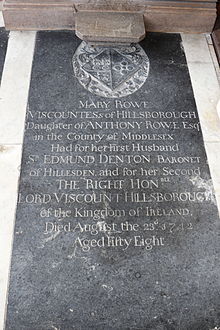Anthony Rowe (after 1641 – 9 September 1704) was an English Whig politician who sat in the House of Commons of England for several periods between 1689 and 1701.[2]


Biography
editRowe was the son of Sir Thomas Rowe of Muswell Hill[3] in Middlesex by his wife Anne Langton. He was a descendant of William Rowe and was a cousin of Thomas Roe.[2]
In the 1670s, Rowe became an associate of James Scott, 1st Duke of Monmouth and served as his adjutant during the Flanders campaign of 1678. In 1679 he was granted lease of a hearth tax tax farm for five years. He remained aligned to Monmouth and in 1683 he was publicly denied any association with the Rye House Plot. Rowe was briefly arrested during the Monmouth Rebellion in 1685, but was soon released, and in March 1688 he was granted a general pardon by James II.[2]
Rowe was a supporter of the Glorious Revolution of 1688 and in 1689 he was appointed to superintend the collection of taxes in western England. The same year, he was elected as a Member of Parliament for Penryn, appointed Clerk of the Green Cloth in the household of William III, and made a justice of the peace for Middlesex. During the Convention Parliament, he compiled and published a blacklist of those MPs who had voted that James II had not left the throne vacant during the Revolution, with the aim of influencing the subsequent election. In 1690, Rowe was returned for Mitchell. He then represented Stockbridge from November to December 1693, before sitting again for Mitchell from January 1701 to March 1701.[2]
Marriage and issue
editHe married Mary Manley, a daughter of Robert Manley, of Stepney, Middlesex, a merchant, but died without male issue, leaving three daughters and co-heiresses:[4]
- Mary Rowe (Viscountess Hillsborough) (1683/4-1742), wife successively of Sir Edmund Denton, 1st Baronet,[5] (1676-1714) of Hillesden, Buckinghamshire, MP, and of Trevor Hill, 1st Viscount Hillsborough (1693-1742)
- Charlotte Rowe (d.1742), wife of Lt-Col. George Forrester, 5th Lord Forrester[6] of Corstorphine
- Arabella/Isabella Rowe, 3rd daughter, wife of John Cockburn (1679-1758) of Ormiston,[6] East Lothian, Scotland, MP.[7]
References
edit- ^ Burke, Sir Bernard, The General Armory, London, 1884, p.866 "Roe of Higham Hall, Essex and Muswell Hill, Middlesex"
- ^ a b c d Cruickshanks, Eveline (1983). B.D. Henning (ed.). "ROWE, Anthony (d.1704), of Whitehall". The History of Parliament: the House of Commons 1660-1690. Boydell and Brewer. Retrieved 5 June 2014.
- ^ Text from: Hornsey in History: Pin’s or (Muswell) Hill, from a 1972 series of Hornsey Journal articles by Ian Murray, first Chairman of Hornsey Historical Society and Haringey Council Archivist. [1]: In 1577 the Muswell Hill Estate passed into the hands of the Rowe family, mentioned in Norden’s History (Speculum Britanniae, 1593). This family produced three Lord Mayors of London, a dramatic poet who is now forgotten except for his editions of Shakespeare, and one of the judges who condemned Charles I, Colonel Owen Rowe.... buried in Hackney Church where most of the same family are buried. In about 1700 Muswell Hill passed into the hands of the Pulteney family, later Earls of Bath
- ^ History of Parliament
- ^ HILL, Trevor (1693-1742), of Hillsborough, co. Down, and Turweston, Bucks., Published in The History of Parliament: the House of Commons 1715-1754, ed. R. Sedgwick, 1970 [2]
- ^ a b Stirnet
- ^ COCKBURN, John (c.1679-1758), of Ormiston, Haddington, Published in The History of Parliament: the House of Commons 1690-1715, ed. D. Hayton, E. Cruickshanks, S. Handley, 2002 [3]